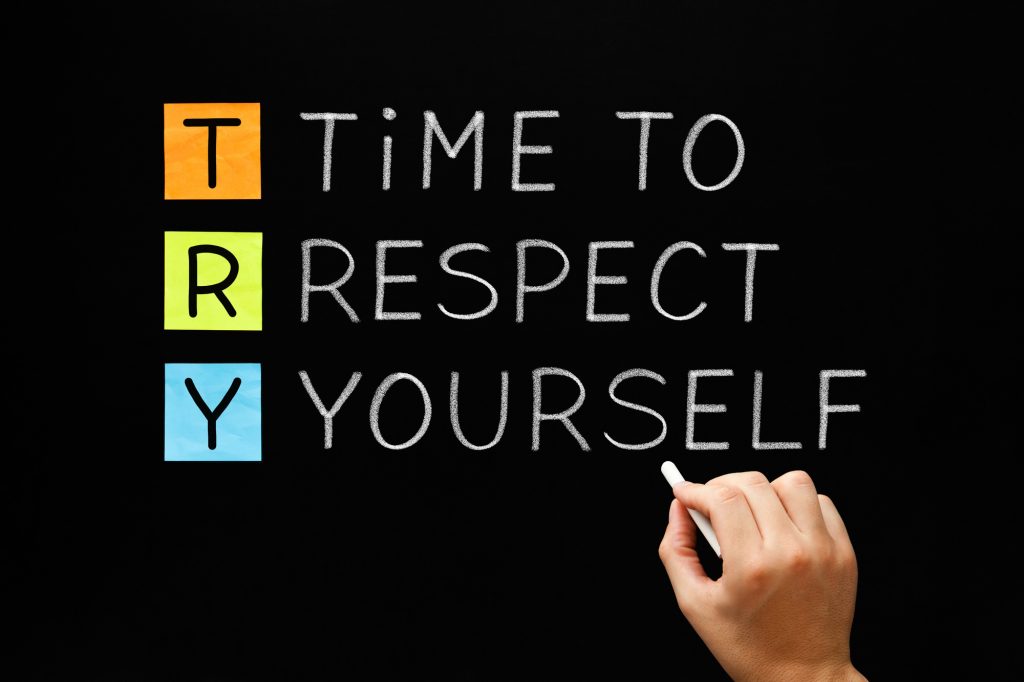8 Ways to Cultivate Self Respect
Do you know the difference between self-esteem and self-respect?
Some might argue they’re the same, but in reality, the two qualities are very different.
Self-esteem relates to how you think of yourself. Self-respect, on the other hand, is based on the actions you take in your life.
In order to improve your self-esteem, you must first improve your self-respect.
Of course, this is easier said than done. But don’t worry. With time and effort, you can take positive actions that will boost your self-respect.
Here are eight important places to start.
1. Create a Self-care Schedule
The first step to a healthy self-respect is to invest time in you.
We all lead busy, stressful lives. If you’re constantly running yourself ragged, how can you have any time or energy left to worry about self-improvement?
Make a list of things that make you feel good. These might include:
- Getting a massage or pedicure
- Taking your dog for a long walk
- Spending time in nature
- Working out with friends
- Yoga or meditation
Whatever activities help you to relax and feel at peace, create time for them in your busy schedule.
2. Look for Red Flags
If a friend, partner, or co-worker makes you feel bad about yourself, don’t ignore it.
When you have a healthy self-respect, you notice warning signs that certain people aren’t good for you. They may put you down, break promises, or otherwise hurt and disappoint you.
Recognize (and believe) that you don’t have to have people like this in your life. So rather than passively put up with it, put your foot down.
As hard as it may be, walking away from a toxic relationship is one of the surest ways to improve your self-respect.
3. Decide What You Will (and Won’t) Tolerate
This goes along with step two. Once you’ve identified the negative influences in your life, it’s up to you to decide definitively what you will and won’t tolerate.
Create an “Absolute No” list of behaviors you will no longer accept. This might include a partner who constantly criticizes you or a friend who gossips behind your back.
Whatever you put on your list be determined to stick with it. Once you eliminate the negative relationships in your life, you open the door for more positive ones to replace them.
4. Surround Yourself with Positive Influences
Whether you like it or not, your friends exert a powerful influence on you.
The people you spend the most time with will influence how you see the world and how you feel about yourself. For this reason, it’s vital to surround yourself with the best influences possible.
Who makes you feel great about yourself? Who have the types of qualities you admire most? These are the people you want to spend time with.
Whenever possible, eliminate time spent with overly critical or negative people. Such toxic thinking will only drag you down.
5. Learn to Accept Criticism
It’s not possible (or healthy) to avoid all forms of criticism. We all make mistakes, and there are times when we need counsel and correction from others.
None of us enjoy being criticized. But when that criticism is constructive, we should try our best to take it to heart.
Rather than taking criticism personally, try to see the reasons behind the critique. Are there aspects of your personality or job performance that you genuinely need to work on?
Of course, some forms of criticism aren’t helpful at all. If the comment was made specifically to tear you down, don’t let it. Respect yourself enough to ignore it and move on.
6. Focus on Motivation, Not Results
There’s nothing worse than disappointment after we’ve poured our hearts into a project. Even if we have the best intentions and motives, sometimes things just don’t work out.
The truth is that our sense of respect shouldn’t depend on our success, wealth, or social status. Achievements (or failures) aren’t what define us.
In fact, there’s scientific research that supports that old saying, Money can’t buy happiness.
If you were motivated to give a project or a person your all, you can feel proud of that. Measure your self-worth by the part you had to play, not by the outcome.
7. Practice Forgiveness
This is perhaps the most important–and most difficult–of our tips.
Forgiving others of past mistakes is vital for your happiness. But equally important is the need to forgive yourself.
Rather than getting stuck in the past, move on from mistakes, regrets, and difficult situations. As long as you dwell on the past, you’ll always feel unworthy or guilty.
Don’t let your past determine your current feelings of worth and respect.
8. Stop Comparing Yourself to Others
There’s no faster way to feel bad about yourself than focusing on how others are superior to you.
The truth is that there will always be someone who’s more successful than you. There will always be someone who’s better looking, drives a nicer car, and owns a bigger house.
Avoid being envious of what others have. Count your own blessings daily.
Do you have a roof over your head? A loving family? Food on the table? These are all things to be thankful for.
So rather than try to keep up with the Joneses, be content with what you have. Those who are impressed by wealth and social status probably aren’t the type of people you want in your life anyway.
Final Thoughts on Self Respect
Gaining a healthy sense of self-respect isn’t something that will happen overnight.
By practicing the tips outlined above, though, each day you’ll feel just a little bit about better about yourself. And as your self-respect improves, so will your self-esteem.
What else can you do to improve your physical, mental, and emotional health? Check out our latest self-improvement posts for more helpful information.




